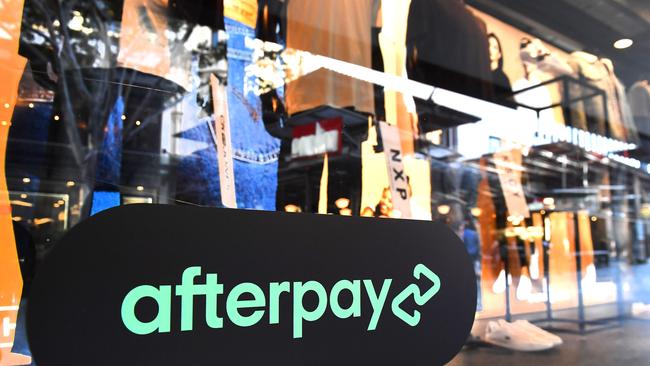Fewer shoppers used buy now, pay later in December: Citi
Fewer customer used buy now, pay later throughout the crucial December shopping period with demand for Zip Co declining by a whopping 37 per cent.

Business
Don't miss out on the headlines from Business. Followed categories will be added to My News.
Fewer customers visited and used Afterpay and Zip Co mobile platforms and websites in December – a critical shopping period – compared to the same time last year, Citi researchers estimate.
In data collated from several sources including SimilarWeb and Sensor Tower, the investment bank said the buy now, pay later sector had a “soft end to the year”.
Zip mobile app downloads declined 37 per cent year-on-year in December, the research note distributed to clients on Wednesday concluded, while Afterpay’s version fell 2 per cent in comparison.
The note comes as Block prepares to finalise its acquisition of Afterpay, and with Zip expected to provide a trading update late this month.
“We forecast total (transaction values) to grow to $2.4bn in (the second quarter of the financial year),” wrote Citi analyst Siraj Ahmed.
The bank forecasts total transaction values to increase 41 per cent, year-on-year, to $1.3bn in Australia and New Zealand, 6 per cent ahead of market expectation – although the increase in total customers could be 100,000 lower than had earlier been thought.
Mr Ahmed said scale was becoming increasingly important as regulatory interest in the sector continued to grow.
“Following the Financial Conduct Authority’s review of BNPL in the UK, the US Consumer Financial Protection Bureau last month opened a probe of BNPL products, sending notices to providers seeking additional data,” Mr Ahmed wrote.
“While increasing regulation is not surprising given the increasing popularity of BNPL, we see the larger-scale players as better placed given the need to invest in the systems and processes to comply with new regulatory requirements.”
Last month, the US Consumer Financial Protection Bureau issued a series of orders to collect information on the risks and benefits of fast-growing BNPL loans to Afterpay, Zip, Affirm, PayPal and Klarna.
Zip shares closed 2 per cent higher on Wednesday at $4. However, they have fallen more than 7 per cent since the start of the year. Afterpay shares rose 4.8 per cent to close at $77.
The Citi analyst research estimates visits to Zip’s website from users in Australia and New Zealand declined 11 per cent last month, year-on-year, and fell 6 per cent for Afterpay. Visits to the LatitudePay website were down 49 per cent, while Humm website visits declined 17 per cent.
However, the Citi data does not account for in-store activity and transactions directly on merchants’ apps. All new users may not download the app and existing users could download the app a few months after joining, the researchers said.
Latitude Group late last week made a $335m offer for Humm’s credit cards and BNPL business, and the sector continues to consolidate.
That transaction will create a combined Latitude Group with more than $8bn of receivables and over five million customers, with 70,000-plus merchants.
“At Latitude, even with the Humm business, we will have two million customers who are BNPL and three million customers interest-free instalment customers, which is really where Humm’s and our heartland is,” the company’s chief executive, Ahmed Fahour, told The Australian after announcing the deal.
In the US, and in line with research from Morgan Stanley, Citi said Afterpay website visits had declined year-on-year in December for the first time. On a month-on-month basis, they were down 15 per cent.
That compared to a boom in visits to rival Affirm and Sezzle’s websites – up 52 per cent and 15 per cent year-on-year respectively, the Citi research found.
Other equities analysts have already warned that the BNPL sector is facing significant headwinds, not only from regulators but from investors who have exited the sector.
In a note to clients sent last week, Morgans analyst Richard Coles said strong financial results for the first half of the financial year were needed to reverse the slide in investor sentiment and, while revenue growth would be strong, both Afterpay and Zip were expected to report losses.
“The sector is suddenly unloved by investors, so solid 1H22 results are required to change sentiment,” Mr Coles wrote. “We expect strong revenue growth for Afterpay and Zip, but we still expect both stocks to report (first-half) losses.”
Independent expert Lonergan Edwards said the declines, experienced across the sector, were due to concerns regarding the impact of rising interest rates and news of the latest Covid-19 variant rather than company-specific factors.
Originally published as Fewer shoppers used buy now, pay later in December: Citi



